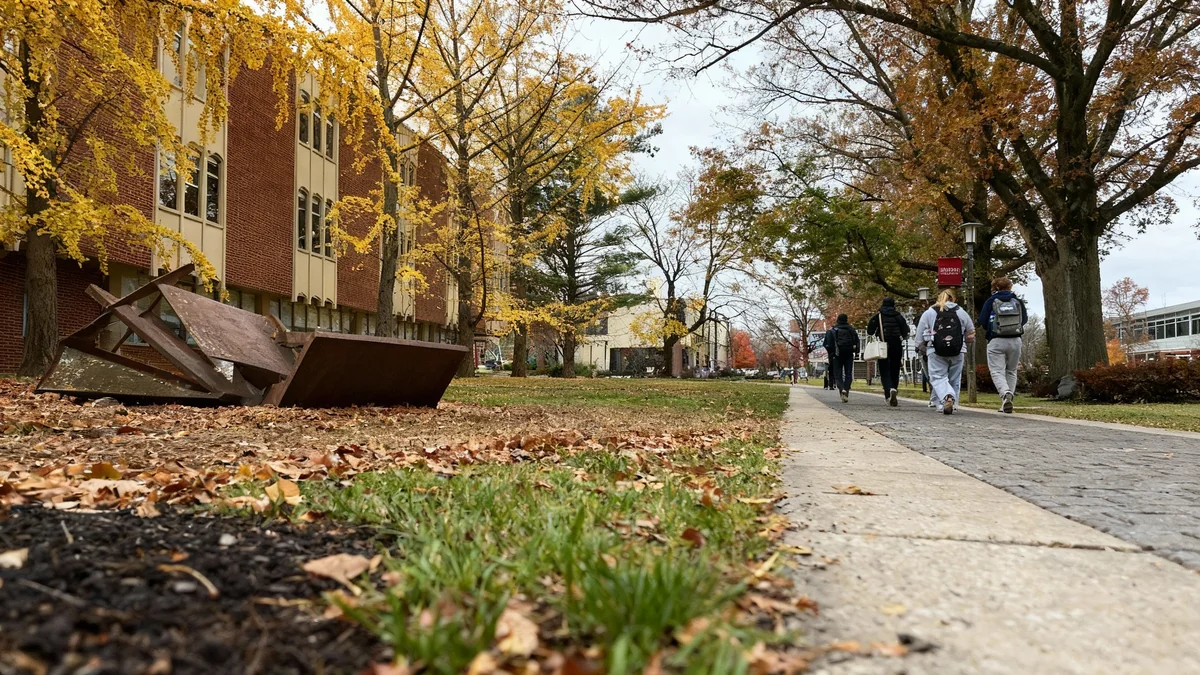Rider University, a private institution in New Jersey, has been placed on probation by its accrediting agency due to significant financial challenges. The move by the Middle States Commission on Higher Education has prompted the university to implement a series of drastic cost-cutting measures, including faculty layoffs, salary reductions for all employees, and changes to scholarship programs.
Key Takeaways
- Rider University was placed on probation by the Middle States Commission on Higher Education on October 30 over concerns about its financial viability.
- The university plans to lay off up to 40 full-time faculty members, reduce all employee salaries by 14%, and suspend retirement contributions.
- Rider remains fully accredited during the probation period, but must submit a recovery plan to the commission.
- Student financial aid from federal sources is not immediately affected, but losing accreditation would jeopardize it in the future.
Accreditation Agency Raises Financial Alarms
The Middle States Commission on Higher Education (MSCHE), the accrediting body for colleges in the mid-Atlantic region since 1952, took the significant step of placing Rider University on probation. The decision, effective October 30, was based on what the commission described as concerns over the university's financial stability.
According to a statement from the university, the commission found "insufficient evidence" that Rider is currently compliant with its financial standards. Probation is a serious public notification that an institution's accreditation is in jeopardy. While the university remains accredited for now, this status signals an urgent need for corrective action.
Losing accreditation would be a severe blow to any university. It could prevent students from receiving federal financial aid, make it difficult for them to transfer credits to other schools, and hinder their ability to pursue graduate studies. However, such an outcome is rare, and the probation period is designed to give institutions time to address the cited issues.
What is Accreditation?
Accreditation is a form of quality assurance for higher education institutions. Regional commissions like MSCHE evaluate universities based on a set of standards covering areas like academic quality, financial stability, and student outcomes. It is a critical requirement for institutions whose students receive federal financial aid.
University Implements 'March to Sustainability Plan'
In response to the probation and its underlying financial pressures, Rider University's administration is moving forward with what it calls the "March to Sustainability Plan." The plan, unanimously approved by the Board of Trustees, involves a series of deep and painful cuts across the institution.
In a message to the campus community, Rider President Gregory G. Dell’Omo acknowledged the difficulty of the situation. "All of us involved are aware that this moment brings pain, frustration, fear and uncertainty," he stated. "We profoundly wish the financial situation were otherwise. We also know that the time has come to make the difficult choices required to secure the very future of the University and the students we serve."
"Having analyzed Rider’s situation from every angle, we are confident that a promising future is possible, only if these steps are taken."
Widespread Cuts Affecting Faculty and Staff
The plan's most significant components directly impact university employees. Between 35 and 40 full-time faculty members will be laid off by the end of the calendar year. According to the student newspaper, Rider News, this represents approximately 25% of the university's current full-time faculty.
In addition to the layoffs, the university is implementing a 14% salary reduction for all employees and suspending its contributions to employee retirement plans. The faculty tuition remission benefit, a common perk in higher education that waives or reduces tuition for employees and their families, will also be eliminated starting in the 2026-27 academic year.
Impact by the Numbers
- 3,625: Total number of students enrolled at Rider University.
- 40: Maximum number of full-time faculty to be laid off.
- 14%: Across-the-board salary reduction for all employees.
- 13-to-1: Current student-faculty ratio, which is expected to increase after the layoffs.
Impact on Students and Academic Programs
While the administration has stated its goal is to minimize the impact on current students, the changes will be felt across campus. The university has assured students that it will offer a spring 2026 curriculum similar to what was previously planned and that all students will be able to complete their intended majors.
However, with a significant portion of the faculty departing, students whose advisors are laid off will be assigned new ones. The university has also suspended its Undergraduate Research Scholar Awards program, which has provided $1,000 scholarships for collaborative student-faculty projects since 2003.
Changes to Scholarships
Athletic scholarships are also being adjusted. While the university will continue to offer the same number of scholarships, the financial amount for future recipients may be reduced in some cases. A university spokesperson confirmed that current student-athletes will retain their scholarships at the same level through graduation.
Despite the turmoil, Rider is continuing its admissions process and is actively accepting applications for future semesters. The early action admission deadline for the fall 2026 semester remains November 15.
A Tight Timeline for Recovery
Rider University is now on a short timeline to prove its financial viability to the accrediting commission. The university must submit two key documents in the coming weeks:
- A "teach-out" plan by December 19: This document must detail how students could complete their degrees at Rider or transfer to another institution if the university were to close. This is a standard requirement for institutions on probation.
- A monitoring report by January 12: This report must provide evidence that the university has a sustainable financial model and is making progress toward compliance with MSCHE standards.
The Middle States Commission on Higher Education will review these materials and is expected to make a decision on Rider's accreditation status at its meeting in March. Other universities, such as New Jersey's Kean University, have successfully emerged from probation after implementing corrective actions, providing a potential path forward for Rider as it navigates this critical period.





